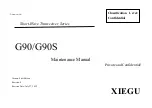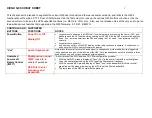
TX FLAT I
TX FLAT GB
TX FLAT F
Trasmettitore per il comando di tende e tapparelle, prodotto nelle versioni per il controllo di due,
sei o ventiquattro automatismi:
TXFLAT2, TXFLAT6, TXFLAT24.
1) CARATTERISTICHE TECNICHE
- Frequenza di funzionamento: 433.92 MHz;
- Potenza effettiva radio: <10mW;
- Codifica: Rolling Code;
- Consumo max: <20mA;
- Temperatura di esercizio: -20 ÷ 55°C;
- Tipo di batteria: CR2032 - 3V Litio.
2) DESCRIZIONE DI FUNZIONAMENTO DEI TASTI
Il Trasmettitore è munito di 5 tasti (Fig.1).
- Tasto di selezione canale
( + )
;
- Tasto di selezione canale
( – )
;
- Tasto UP: apre;
- Tasto DOWN: chiude;
- Tasto STOP: non utilizzato.
La pressione del tasto “UP” del radiocomando permetterà l’alzata della tapparella, viceversa, il
tasto “DOWN” permette l’abbassamento. Durante la corsa, la pressione del tasto opposto al
movimento causerà lo “STOP” della tenda (o tapparella).
Il radiocomando dispone di due tasti funzione
( – )
e
( + )
con i quali è possibile ruotare i LED di
segnalazione per la scelta del canale di trasmissione desiderato.
La trasmissione dei comandi ad ogni singola utenza è evidenziata dal lampeggio del LED di
trasmissione (Fig.1).
3) PROGRAMMAZIONE RADIOCOMANDO PER SISTEMI SPOT, EAGLE, LS1292 E TRONIC
Il primo radiocomando che viene memorizzato è definito “MADRE” ed acquisisce
automaticamente le seguenti caratteristiche:
- Determina il verso di azionamento della tenda da sole/tapparella in base al tasto utilizzato
durante la fase di memorizzazione.
- È l’unico radiocomando che può attivare la fase di programmazione.
Per memorizzare il radiocomando “MADRE” procedere come illustrato di seguito.
a)
Alimentare la centralina;
b)
Premere e mantenere premuto il pulsante
PROG
del radiocomando finché il motoriduttore
non segnalerà tramite due movimenti brevi sulla tenda/tapparella, uno di salita e l’altro di
discesa, l’entrata in programmazione (Fig.2).
c)
Premere il tasto del radiocomando “MADRE” da memorizzare; a questo punto la centralina
memorizza il radiocomando ed esce automaticamente dallo stato di programmazione.
In un installazione con più tende motorizzate può nascere l’esigenza di avere un unico
radiocomando, denominato “GLOBALE”. Prima di procedere alla memorizzazione di un
radiocomando “GLOBALE” su ogni centralina è necessario che tutti i “MADRE” siano concordi
nel verso di movimentazione della tenda (o tapparella). Procedere alla memorizzazione del
radiocomando “GLOBALE” nel seguente modo:
- Premere e mantenere premuto il pulsante
PROG
del radiocomando “MADRE” per entrare in
programmazione.
- Premere i tasti di selezione
( + )
o
( – )
del TX FLAT fino a che tutti i LED di segnalazione si
accenderanno e premere il tasto UP o DOWN per memorizzare il codice.
- Programmare questo codice su tutte le altre utenze ripetendo la procedura appena descritta.
4) SOSTITUZIONE DELLA BATTERIA
La sostituzione della batteria va eseguita quando la portata radio diventa insufficiente alle
proprie esigenze d’utilizzo, o quando l’intensità del led di trasmissione è molto debole. Per
l’orientamento della batteria di ricambio si deve rispettare la polarità indicata nel relativo
alloggiamento (Fig.3).
5) ATTENZIONE:
Le batterie contengono elementi chimici altamente inquinanti. Devono quindi essere smaltite
utilizzando gli opportuni accorgimenti secondo le Norme eco-ambientali vigenti. (Il costruttore
raccomanda lo smaltimento per mezzo della raccolta differenziata). Il radiocomando è stato
progettato e realizzato esclusivamente per l’utilizzo come sopra specificato. Il costruttore declina
ogni responsabilità per l’uso improprio o manomissioni degli stessi.
6) DICHIARAZIONE DI CONFORMITA’ CE
Il costruttore dichiara che i prodotti:
• Radiocomandi Rolling Code della serie TX FLAT2, TX FLAT6, TX FLAT24 sono conformi alle
specifiche della Direttiva Europea R&TTE 99/5/EC e basati sulle seguenti norme armonizzate:
- ETS EN 301 489-1; ETS EN 301 489-3;
- ETS EN 300 220-1; ETS EN 300 220-3;
- EN 60215.
Transmitter for the control of sun blinds and rolling shutters, available in two, six or twenty-four
channels versions:
TXFLAT2, TXFLAT6, TXFLAT24.
1) TECHNICAL FEATURES
- Operating frequency: 433.92 MHz;
- Effective radio power: <10mW;
- Encryption: Rolling Code;
- Max power consumption: <20mA;
- Working temperature: -20 ÷ 55°C;
- Battery type: CR2032 - 3V Lithium.
2) DESCRIPTION OF BUTTON OPERATIONS
- The Transmitter has 5 buttons (Fig.1).
- Channel selector
( + )
;
- Channel selector
( – )
;
- UP button: open;
- DOWN button: close;
- STOP button: not used.
Pressing the “UP” button of the radio control unit raises the blind, whereas pressing the “DOWN”
button lowers it. When the blind is moving, pressing the “STOP” button will halt movement of the
blind.
The radio control has two function buttons,
( – )
and
( + )
, which are used to select the required
transmission channel and operate in conjunction with the indicator LEDs.
Acknowledgement of commands transmitted to each unit is provided by the flashing
transmission LED (Fig.1).
3)
PROGRAMMING OF THE REMOTE CONTROL FOR SYSTEMS SPOT, EAGLE, LS1292
AND TRONIC
The first radio control switch to be memorised is known as the “MOTHER” and automatically
acquires the following characteristics:
- It establishes the roller window blind/awning direction of movement on the basis of the key
used during the memorisation phase.
- It is the only radio control switch able to activate the programming phase.
Proceed as follows to memorise the “MOTHER” radio control switch.
a)
Connect the control unit to the power supply;
b)
Press and hold down
PROG
button of the radio control until two brief movements of the
blind/awning (one up and one down) are observed. This indicates that the system is in
programming mode (Fig.2).
c)
Press a key on the “MOTHER” radio control switch to be memorised. At this point the system
memorises the radio control switch and automatically exits from programming mode.
In an installation with a number of motorised blinds, there may be a need to have a single
transmitter mobile, denominated “GLOBAL”. Before proceeding to memorise a “GLOBAL”
RADIO CONTROL CODE on each control unit, all the “MOTHER” radio control code must be
coordinated for direction of movement of the blinds.
Proceed to memorise the “GLOBAL” radio
control code in the following way:
- Press and hold down
PROG
button of the radio control to enter in the programming mode.
- Press the
( + )
or
( – )
selection buttons until all the indicator LEDs will light and press the UP or
DOWN button to memorize the code.
- Memorize this code on all the utilities repeating the procedures described above.
4) REPLACING BATTERY
Replace the battery when the radio range power decrease or the led light intensity becomes too
feeble. Respect the correct polarity indicated in the battery compartment when replace the
battery (Fig.3).
5) WARNING:
Batteries contain pollutant elements, must be disposed of in accordance with environmental
laws. (The manufacturer advise to use a specific disposal system).
The remote control have been created and realized for the only use as specified here. The
manufacturer declines every responsibility for damages caused by wrong installation or improper
use.
6) STATEMENT OF COMPLIANCE CE
The manufacturer states that the products:
• Remote Controls Rolling Code series TX FLAT2, TX FLAT6, TX FLAT24 are in compliance
with the European directive R&TTE 99/5/EC and based on the following harmonized norms:
- ETS EN 301 489-1; ETS EN 301 489-3;
- ETS EN 300 220-1; ETS EN 300 220-3;
- EN 60215.
Émetteur pour le commande de rideaux et stores. Il est produit en différentes versions pour
manager deux, six ou vingt à quatre automations.
TXFLAT2, TXFLAT6, TXFLAT24.
1) CARACTÉRISTIQUES TECHNIQUES
- Fréquence de service: 433,92 MHz;
- Puissance radio effective: < 10 mW;
- Code: 66 bits Rolling Code;
- Consommation max.: < 20 mA;
- Température de service: -20 ÷ 55°C;
- Type de batterie: CR2032 - 3V Lithium.
2) DESCRIPTION DU FONCTIONNEMENT DES TOUCHES
Le transmetteur est muni de 5 touches (Fig.1).
- Touche de sélection de canal
( + )
;
- Touche de sélection de canal
( – )
;
- Touche UP: ouverture;
- Touche DOWN: fermeture;
- Touche STOP: non utilisé.
La pression du bouton « UP » de la radiocommande permettra l’ouverture du volet roulant, vice-
versa, le bouton « Down » en permettra la fermeture. Durant la course, la pression du bouton
opposé au mouvement causera le « STOP » (arrêt) du store (ou volet roulant).
La radiocommande est équipée de deux touches fonction
( – )
et
( + )
qui permettent de tourner
les leds de signalisation pour choisir le canal d’émission souhaité.
La transmission des canaux à chaque dispositif commandé est indiquée par le clignotement du
voyant de transmission (Fig.1).
3) PROGRAMMATION DE LA RADIOCOMMANDE POUR LES SYSTEMES SPOT, EAGLE,
LS 1292 et TRONIC
La première radiocommande qui est mémorisée est définie “MÈRE” et acquiert
automatiquement les caractéristiques suivantes :
- elle détermine le sens d’ actionnement du volet roulant en fonction de la touche utilisée
pendant la phase de mémorisation.
- Elle est la seule radiocommande qui peut activer la phase de programmation.
Pour mémoriser la radiocommande “MÈRE”, procéder comme illustré ci-dessous.
a)
alimenter la centrale ;
b)
passer et maintenir appuyées le
PROG
touche de la radiocommande jusqu ‘à ce que le
moteur signale, par deux mouvements brefs du volet, un en montée l’ autre en descente, l’entrée
en programmation (Fig2).
c)
pousser la touche de la radiocommande “MÈRE” qu’il faut mémoriser; maintenant la centrale
a mémorisé la radiocommande et sort automatiquement de la programmation.
Dans une installation comprenant plusieurs stores motorisés, on pourrait ressentir le besoin
d’avoir un seul transmetteur portable, dénommé « GLOBALE ».
Avant de procéder à la
mémorisation d’un radiocommande « GLOBAL » sur chaque centrale il est nécessaire que
toutes les radiocommande « MÈRE » soient synchrones dans le sens de déplacement du store
(ou volet roulant).
Procéder à la mémorisation de la radiocommande « GLOBAL » selon les
indications:
- Passer et maintenir appuyées le
PROG
touche de la radiocommande pour activer la phase de
programmation.
- Appuyer sur la touche de sélection
( + )
ou
( – )
jusqu’à toutes les Leds de signalisation
s’allumeront ;
- Programmer ce code sur tous les autres utilisateurs en répétant la procédure ci-dessus.
4) CHANGEMENT DES PILES
Les piles doivent être changées quand la portée radio n’est plus suffisante ou quand l’intensité
du LED de transmission est faible. Pour le sens d’insertion des piles, il faut respecter la polarité
indiquée dans le logement (Fig.3).
5) ATTENTION:
Les piles contiennent des éléments chimiques très polluants. Elles doivent être recueillies en
utilisant toutes les précautions d’usage selon les normes écologiques en vigueur. (Le
constructeur conseille l’écoulement des piles par la pratique du tri sélectif). L’ émetteur est
réalisé exclusivement pour être utilisées comme indiqué ci-dessus. Le constructeur décline toute
responsabilité en case d’usage incorrect ou impropre du produit.
6) DECLARATION DE CONFORMITE CE
Le constructeur déclare que les produits:
• Radiocommande Rolling Code de la série TX FLAT2, TX FLAT6, TX FLAT24 est conforme aux
spécification de la Directive R&TTE Européenne 99/5/EC et basées sur les normes harmonisées
suivantes:
- ETS EN 301 489-1; ETS EN 301 489-3;
- ETS EN 300 220-1; ETS EN 300 220-3;
- EN 60215.




















